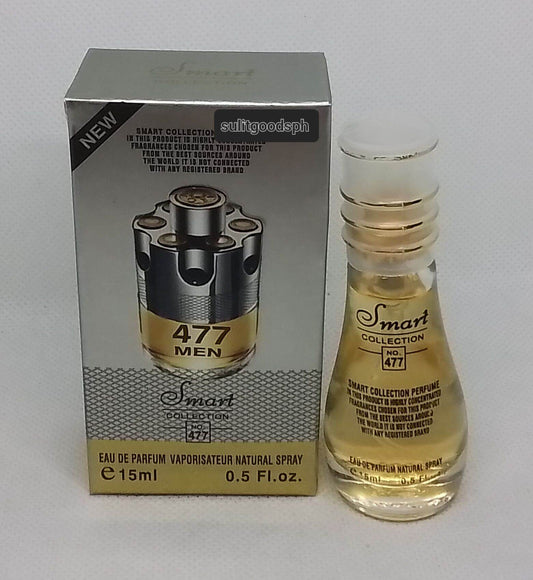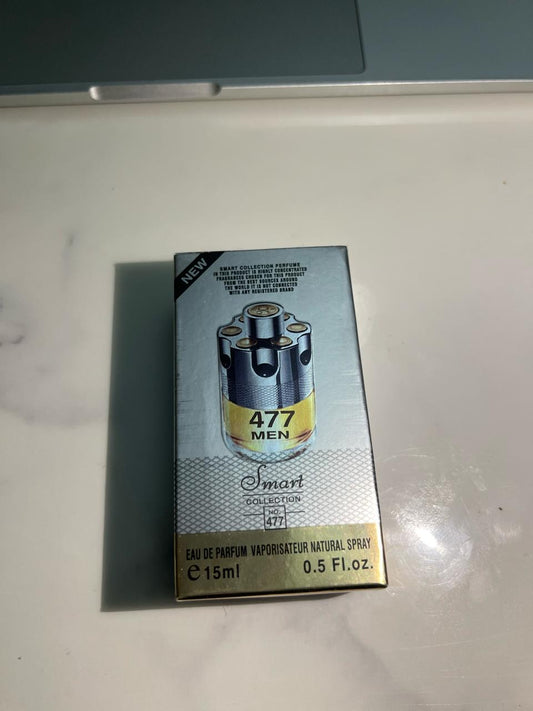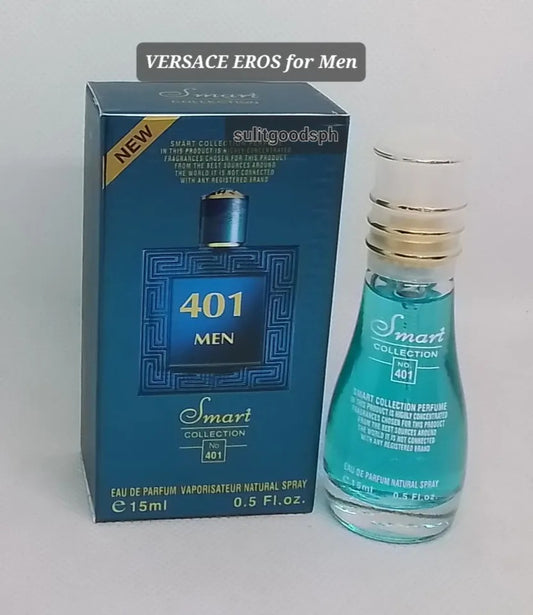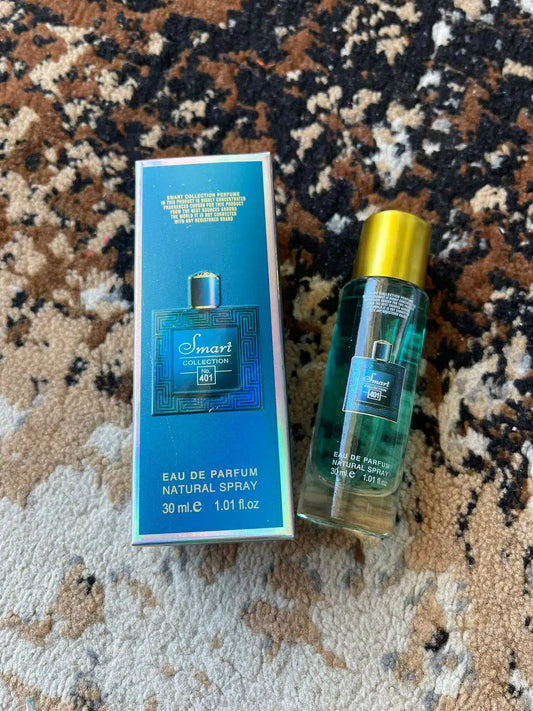Collection: Fragrance
-
SMART COLLECTION PERFUME NO. 477 FOR MEN
Regular price Dhs. 40.00Regular priceUnit price / per -
Smart Collection Perfume 401
Regular price Dhs. 33.00Regular priceUnit price / perDhs. 38.00Sale price Dhs. 33.00Sale
Fragrance UAE: Your 2025 Guide to Perfumes in the Emirates
Imagine stepping into a bustling Dubai souk, where the air is thick with the warm, spicy notes of oud, the delicate sweetness of rose, and the smoky allure of bakhoor. Fragrances in the UAE aren’t just scents, they’re a way of life, woven into the fabric of Emirati culture, from ancient trade routes to modern luxury malls. Whether you’re a local seeking your signature scent, an expatriate exploring the UAE’s perfume scene, or a global enthusiast curious about Arabian perfumery, this guide is your roadmap to the vibrant world of fragrances in the UAE. At srproductionhouse.com, we’re passionate about crafting scents that capture the essence of the Emirates, and we’re here to share everything you need to know about the UAE fragrance market in 2025.
History of Perfumery in the UAE
Perfumery in the UAE is as old as the desert sands, rooted in a history that stretches back thousands of years. The Arabian Peninsula, with its strategic position along ancient trade routes, was a crossroads for spices, resins, and aromatic oils. Frankincense from Oman, saffron from Persia, and oud from India converged in the souks of what is now the UAE, creating a melting pot of scents that shaped the region’s olfactory identity.
In ancient times, perfumes were more than luxury, they were sacred. Emirati tribes used frankincense and myrrh in religious rituals, believing their smoke carried prayers to the heavens. Oud, derived from the resinous heartwood of the agarwood tree, was burned to ward off evil spirits and honor guests. Attars, concentrated perfume oils, were crafted by skilled artisans and worn as a mark of status. These traditions laid the foundation for the UAE’s enduring love affair with fragrance.
The rise of Islam in the 7th century elevated perfumery further. The Prophet Muhammad is said to have loved fragrances, particularly rose and musk, and his teachings emphasized cleanliness and pleasant scents. This religious endorsement cemented perfumes as a daily ritual, with attars and bakhoor becoming staples in Emirati households. By the medieval period, the UAE’s ports, like Sir Bani Yas, were bustling hubs for the global incense trade, exporting Arabian scents to Europe, India, and China.
The 20th century brought modernization but didn’t dim the UAE’s passion for perfume. The discovery of oil in the 1960s fueled economic growth, turning Dubai and Abu Dhabi into luxury destinations. Traditional souks like Deira’s Perfume Souk thrived alongside gleaming malls, where brands like Abdul Samad Al Qurashi (founded in 1852) offered ouds and attars to a new generation. Today, the UAE blends its ancient heritage with cutting-edge innovation, producing scents that captivate the world.
This history isn’t just a backdrop; it’s a living legacy. Walk into a UAE home, and you’ll likely find a bakhoor burner glowing, its smoke curling through the air. Visit a perfumer like Ajmal, and you’ll see artisans blending oils with the same care as their ancestors. The UAE’s past continues to shape its scented present, making it a unique player in global perfumery.
Cultural Significance of Fragrances in the UAE
In the UAE, fragrance is more than a personal choice; it’s a cultural cornerstone, a silent language of hospitality, identity, and tradition. Perfumes are woven into every aspect of Emirati life, from daily routines to grand celebrations, reflecting a society where scent is synonymous with respect and refinement.
Hospitality is a pillar of Emirati culture, and fragrances play a starring role. When guests enter a home, they’re often greeted with the smoky aroma of bakhoor, a blend of oud, sandalwood, and spices burned on charcoal. This ritual, passed down through generations, signals warmth and honor. A silver burner might be passed around, with guests wafting the fragrant smoke onto their clothes, a gesture as natural as offering tea. Perfume oils, like rose or musk attars, are also offered, applied to the wrists or neck as a sign of welcome.
Fragrances shine brightest during celebrations. At Emirati weddings, brides are adorned with layers of scent, oud for depth, jasmine for sweetness, and amber for warmth, creating a signature that lingers through the festivities. During Ramadan and Eid, families exchange luxurious perfume gift sets, often from brands like Arabian Oud, as tokens of love. These gifts aren’t just presents; they’re expressions of status and thoughtfulness, wrapped in ornate packaging that rivals the scent inside.
Gender plays a fascinating role in UAE fragrance culture. Men often gravitate toward bold, woody scents like oud and sandalwood, reflecting strength and tradition. Women may choose softer florals or layered blends, though unisex fragrances are gaining popularity, with 7.4% CAGR growth in this category. Scents are chosen to complement the UAE’s hot climate, where long-lasting oils and eau de parfums thrive. Fragrance isn’t just about smelling good, it’s about projecting confidence and cultural pride.
Socially, perfumes are a status symbol. In a country where luxury is celebrated, owning a bottle from Amouage or Abdul Samad Al Qurashi signals wealth and taste. Yet, affordability matters too, with brands like Rasasi offering quality scents for diverse budgets. This balance of prestige and accessibility defines the UAE’s fragrance culture, where everyone, from royalty to students, finds a scent to call their own.
Fragrances also tie to spirituality. Non-alcoholic perfumes, like those from Naseem Perfumes, cater to religious consumers who avoid alcohol-based scents for prayer. Musk and amber oils are favored for their purity, often applied before Friday prayers. This interplay of faith and fragrance underscores the UAE’s unique approach to perfumery, where scent is both sacred and social.
Types of Fragrances in the UAE
The UAE’s fragrance market is a kaleidoscope of scents, reflecting its cultural diversity and consumer preferences. Below, we explore the main fragrance types, their significance, and their appeal in the Emirates.
Oud-Based Fragrances
- Overview: Oud, derived from agarwood, is the UAE’s olfactory crown jewel. Its rich, smoky, and woody notes are synonymous with luxury.
- Cultural Significance: Used in religious rituals, weddings, and hospitality, oud is a status symbol, often costing thousands per ounce.
- Popular Examples: Arabian Oud’s Kalemat, Al Haramain’s Oud Cambodi.
- Appeal: Long-lasting and intense, oud suits the UAE’s hot climate and cultural preference for bold scents.
- Trends: Blends with floral or fruity notes (e.g., oud-rose) are gaining traction.
Non-Alcoholic Perfumes
- Overview: Alcohol-free oils and attars, like those from Naseem Perfumes, use water or oil bases.
- Cultural Significance: Preferred by religious consumers for prayer, as alcohol is considered impure in some Islamic contexts.
- Popular Examples: Naseem’s Musk Safi, Ajmal’s Mukhallat.
- Appeal: Gentle on sensitive skin, long-lasting, and culturally resonant.
- Trends: Growing demand due to health consciousness and religious preferences.
Floral Fragrances
- Overview: Scents featuring rose, jasmine, or tuberose, often layered with other notes.
- Cultural Significance: Rose is tied to Islamic tradition and femininity, used in weddings and gifting.
- Popular Examples: Swiss Arabian’s Kashkha, Rasasi’s Sonia.
- Appeal: Soft and versatile, appealing to women and younger consumers.
- Trends: Layering florals with oud or musk for depth.
Citrus and Fruity Fragrances
- Overview: Light, fresh scents with notes like bergamot, lemon, or mango.
- Cultural Significance: Less traditional but growing among expatriates and youth.
- Popular Examples: Rasasi’s Hawas, Ajmal’s Blu.
- Appeal: Ideal for daytime and UAE’s warm weather.
- Trends: Rising popularity for their refreshing, modern vibe.
Woody and Oriental Fragrances
- Overview: Warm, spicy scents with sandalwood, amber, or saffron, often unisex.
- Cultural Significance: Tied to Arabian heritage, used in formal settings.
- Popular Examples: Ajmal’s Amber Wood, Fragrance World’s Oud Edition.
- Appeal: Sophisticated and long-lasting, favored by men and professionals.
- Trends: Blending with Western notes for global appeal.
Concentration Levels
- Eau de Parfum (20–30% oil): Dominates due to longevity, ideal for UAE’s climate.
- Eau de Toilette (5–15% oil): Popular for lighter, daytime scents.
- Attar/Oil (100% oil): Traditional, long-lasting, and concentrated, favored for cultural use.
- Eau de Cologne (2–5% oil): Less common but used in fresh, affordable blends.
The UAE’s fragrance diversity reflects its cosmopolitan population and deep-rooted traditions, with oud and non-alcoholic scents leading the charge.
Ingredient Sourcing and Production
Crafting a fragrance is like composing a symphony, with each ingredient playing a vital note. In the UAE, perfumery is an art that balances ancient techniques with modern science, using premium ingredients sourced globally and locally. Let’s explore the key components and production processes.
Key Ingredients
- Oud: Sourced from India, Cambodia, and Malaysia, oud is the heart of Arabian perfumery. Its rarity, formed when agarwood trees are infected by a specific mold, makes it pricier than gold. Ethical sourcing is a challenge, as overharvesting threatens forests.
- Rose: Taif roses from Saudi Arabia and Damask roses from Oman are prized for their rich, sweet aroma. A single kilogram of rose oil requires 4,000 kilograms of petals, driving costs.
- Saffron: Harvested in Iran and Kashmir, saffron adds a warm, spicy depth. Its labor-intensive production makes it one of the world’s most expensive spices.
- Musk: Traditionally animal-derived, synthetic musk is now common due to ethical concerns. It provides a smooth, lingering base note.
- Amber: Often a blend of resins, amber offers a warm, resinous sweetness, sourced from the Middle East and North Africa.
Sourcing Practices
- Global Supply Chains: The UAE imports high-quality ingredients, leveraging its trade hub status. For example, Fragrance World sources oud from Southeast Asia and rose from the Middle East.
- Local Contributions: Oman’s frankincense and UAE’s date-inspired notes add regional flair. Amouage, based in Oman, leads in sustainable sourcing.
- Sustainability Challenges: Overharvesting and climate change threaten ingredients like oud and sandalwood. Brands like Ajmal are investing in sustainable farms to address this.
Production Methods
- Traditional: Artisans distill oils using copper stills, as seen in small-scale attar production. This labor-intensive process preserves cultural authenticity.
- Modern: High-tech labs, like those at Aster Light Industries, use gas chromatography to analyze and blend scents precisely. AI-driven formulation is emerging, personalizing scents based on consumer preferences.
- Blending: Perfumers layer top (citrus, floral), heart (rose, jasmine), and base (oud, musk) notes to create harmony. A single fragrance may take years to perfect.
- Quality Control: UAE brands adhere to strict standards, with ESMA (Emirates Authority for Standardization and Metrology) ensuring ingredient safety.
SR Production House’s Approach
We source ethically, partnering with sustainable suppliers for oud, rose, and saffron. Our production blends tradition (hand-crafted attars) with innovation (AI-assisted blending), ensuring quality and eco-consciousness. Every bottle tells a story of the UAE’s scented heritage.
Fragrance Trends and Innovations
The UAE fragrance market is a hotbed of innovation, driven by evolving consumer tastes and global trends. Here are the key trends shaping the industry in 2025.
Eco-Friendly Fragrances
- Overview: Consumers, especially Gen Z, demand natural, vegan, and cruelty-free scents. Over 60% of millennials prefer eco-conscious products.
- Examples: Guerlain’s Bee Bottle refill program, srproductionhouse.com’s biodegradable packaging.
- Impact: Brands adopting sustainable practices gain a competitive edge, aligning with UAE’s environmental goals.
Custom and Private-Label Perfumes
- Overview: Personalized scents, crafted via consultations or AI, are booming. Private-label services, like those from Aster Light Industries, cater to businesses.
- Examples: Amouage’s bespoke services, srproductionhouse.com’s custom scent workshops.
- Impact: Personalization enhances customer loyalty, with 73% of Gen Z seeking unique scents.
Layering Techniques
- Overview: Combining multiple fragrances (e.g., oud with rose) creates signature scents, popularized on #PerfumeTok.
- Examples: Swiss Arabian’s layering guides, Rasasi’s complementary oils.
- Impact: Encourages experimentation, boosting sales of complementary products.
Technology and AI
- Overview: AI-driven scent design, like Givaudan’s collaborations, tailors fragrances to individual preferences. VR experiences, like Dior’s Immersive Journey, enhance engagement.
- Examples: Snif’s AI-customized blends, srproductionhouse.com’s online scent quiz.
- Impact: Technology makes perfumery accessible and interactive, driving e-commerce growth.
Cultural Fusion
- Overview: Blending Arabian notes (oud, saffron) with Western notes (citrus, vanilla) appeals to global and local audiences.
- Examples: Ajmal’s Golden Hawk, Fragrance World’s Oud Edition.
- Impact: Broadens market reach, reflecting UAE’s cosmopolitan identity.
These trends position the UAE as a leader in global perfumery, with srproductionhouse.com at the forefront, offering sustainable, personalized, and culturally rich scents.
How to Choose a Fragrance in the UAE
Choosing a fragrance in the UAE is an art, given the dizzying array of options and cultural nuances. Here’s a detailed guide to finding your perfect scent.
Factors to Consider
- Skin Chemistry: Fragrances react differently on each person’s skin. Oud may smell smoky on one person and sweeter on another due to pH levels.
- Occasion: Bold ouds suit evening events, while citrus or floral scents work for daytime or office settings.
- Climate: The UAE’s heat intensifies fragrances, making eau de parfums and oils ideal for longevity.
- Season: Heavy scents (amber, musk) shine in winter, while lighter ones (citrus, aquatic) suit summer.
Testing Tips
- Sample on Skin: Spray or dab on your wrist and wait 30 minutes for the scent to develop. Avoid rubbing, as it alters the fragrance.
- Limit Tests: Try no more than three scents at a time to avoid olfactory fatigue.
- Visit Reputable Stores: Shop at trusted retailers like srproductionhouse.com, V Perfumes, or Dubai Mall’s fragrance counters for authentic products.
Layering Techniques
- Start Simple: Pair a base (oud or musk) with a top note (rose or citrus). For example, layer Naseem’s Musk Safi with Swiss Arabian’s Kashkha.
- Experiment Gradually: Test combinations on a small skin patch before full application.
- Use Complementary Products: Body oils or lotions in matching scents enhance longevity.
Avoiding Counterfeits
- Check Packaging: Authentic perfumes have high-quality boxes, clear logos, and batch numbers.
- Buy from Trusted Sources: Avoid unofficial online sellers. Stick to srproductionhouse.com, Sephora.ae, or duty-free shops.
- Price Check: If a luxury scent is suspiciously cheap, it’s likely fake.
Where to Buy
- Online: srproductionhouse.com, and Amazon.ae offer variety and reviews.
- Retail: Dubai Mall, Mall of the Emirates, and Deira’s Perfume Souk provide hands-on experiences.
- Duty-Free: DXB Airport’s duty-free shops are ideal for tourists seeking deals.
Choosing a fragrance is personal, like picking a song that resonates with your soul. Take your time, explore, and let the UAE’s scented world guide you.
Regulatory Landscape for Fragrances in the UAE
The UAE’s fragrance industry operates under strict regulations to ensure consumer safety and market integrity. Understanding these standards is key for brands and consumers alike.
Key Regulations
- Ingredient Safety: The Emirates Authority for Standardization and Metrology (ESMA) bans harmful substances, like certain synthetic musks, and restricts allergens (e.g., linalool, limonene).
- Labeling Requirements: Products must list ingredients, concentration, and batch numbers. Non-alcoholic perfumes require clear labeling to meet religious preferences.
- Import/Export Standards: Perfumes must comply with GCC Standardization Organization (GSO) guidelines, ensuring quality for re-export.
- Advertising Rules: Claims (e.g., “all-natural”) must be substantiated to avoid misleading consumers.
Consumer Safety
- Allergen Concerns: Regulations limit 26 known allergens to prevent skin reactions, especially in synthetic fragrances.
- Testing Standards: Products undergo rigorous testing for microbial contamination and heavy metals.
- Eco-Friendly Push: ESMA encourages biodegradable packaging and sustainable ingredients, aligning with UAE’s Vision 2030.
Challenges
- Compliance Costs: Small brands face high costs for testing and reformulation, especially with 2025’s global bans on 48 ingredients (IFRA 51st Amendment).
- Counterfeit Enforcement: Despite regulations, fake perfumes persist, requiring vigilant monitoring.
SR Production House’s Compliance
We adhere to ESMA and GSO standards, using safe, high-quality ingredients and transparent labeling. Our sustainable practices, like refillable bottles, align with UAE’s environmental goals, ensuring trust and safety for our customers.
Fragrance Gifting Culture in the UAE
Gifting perfumes is a cherished tradition in the UAE, reflecting generosity, status, and cultural pride. From Ramadan to weddings, fragrances are the gift of choice, wrapped in meaning and luxury.
Cultural Context
- Ramadan and Eid: Families exchange perfume gift sets, often from Arabian Oud or Ajmal, as tokens of goodwill. These sets, priced from AED 200 to 5,000, feature ornate packaging.
- Weddings: Brides and grooms receive custom blends or luxury scents, symbolizing a fragrant new chapter.
- Corporate Gifting: Businesses gift branded perfumes to clients, with private-label options from Aster Light Industries gaining popularity.
Trends
- Luxury Gift Sets: Brands like Abdul Samad Al Qurashi offer sets with oud, attars, and bakhoor, priced for exclusivity.
- Personalization: Engraved bottles or custom scents, like those from srproductionhouse.com, add a personal touch.
- Eco-Friendly Gifting: Sustainable packaging, like Chanel’s refill stations, appeals to younger buyers.
SR Production House’s Gifting Solutions
Our curated gift sets combine oud, rose, and musk in eco-friendly packaging, perfect for Eid or corporate events. Custom engraving and scent consultations make our gifts unforgettable, blending tradition with modern flair.
Fragrance Events and Exhibitions in the UAE
The UAE is a global stage for fragrance, hosting events that showcase innovation and heritage. These gatherings draw perfumers, brands, and enthusiasts, cementing the UAE’s status as a perfumery hub.
Key Events
- Beautyworld Middle East: Held annually in Dubai, this trade show features 1,500+ exhibitors, including Ajmal and Rasasi. In 2025, expect AI-driven scent demos and sustainable packaging showcases.
- Dubai Perfume Summit: A niche event focusing on oud and attar trends, attracting global perfumers.
- Souk Festivals: Deira’s Perfume Souk hosts seasonal events, with artisans demonstrating bakhoor and attar crafting.
- Brand Workshops: Amouage and Swiss Arabian offer scent-mixing classes at Dubai Mall, engaging consumers.
Impact
- Industry Networking: Events connect brands with suppliers, fostering collaborations like SAPIL’s 2024 launches.
- Consumer Engagement: Workshops and festivals educate buyers, boosting brand loyalty.
- Global Influence: Beautyworld’s reach amplifies UAE’s role in shaping global fragrance trends.
SR Production House’s Involvement
We plan to exhibit at Beautyworld 2025, showcasing our sustainable scents and custom blends. Our workshops will invite consumers to craft their own Emirati-inspired fragrances, bridging tradition and innovation.
The Role of SR Production House’s in the UAE Fragrance Market
At srproductionhouse.com, we’re more than a brand—we’re storytellers, crafting fragrances that capture the UAE’s soul. Our mission is to blend heritage with innovation, offering scents that resonate with locals, expatriates, and global enthusiasts.
Our Unique Offerings
- Custom Fragrances: Our AI-driven scent quiz and in-person consultations create personalized blends, from oud-rose to citrus-musk.
- Eco-Friendly Practices: We use biodegradable packaging and ethically sourced ingredients, reducing our carbon footprint.
- Affordable Luxury: Our scents rival high-end brands but are priced for accessibility, starting at AED 150.
- Cultural Resonance: Our Desert Rose collection, inspired by UAE’s flora, celebrates Emirati identity.
Addressing Market Gaps
- Sustainability: Unlike competitors with limited eco-focus, we prioritize natural ingredients and refillable bottles.
- Digital Engagement: Our blog and social media offer guides on layering, sourcing, and trends, filling the content gap left by brands like Ajmal.
- Personalization: We make bespoke scents mainstream, unlike niche-only players like Amouage.
Future Vision
We aim to expand our retail presence in Dubai and Abu Dhabi, launch a mobile app for virtual scent trials, and partner with sustainable suppliers. By 2030, we aspire to be the UAE’s go-to brand for authentic, eco-conscious fragrances.
Future of the UAE Fragrance Market
The UAE fragrance market is poised for explosive growth, projected to reach USD 1,724 million by 2033. Here’s what’s on the horizon.
Predicted Trends
- AI and Biotech: AI-driven scent design and lab-grown ingredients will personalize and sustain perfumery.
- Sustainability: Zero-waste packaging and vegan fragrances will dominate, driven by Gen Z’s 68% preference for eco-products.
- Cultural Evolution: Blends of Arabian and global notes will expand, with brands like srproductionhouse.com leading the charge.
- E-commerce Dominance: Online sales will hit 60% market share by 2037, with platforms offering VR scent trials.
Challenges
- Regulatory Hurdles: Stricter rules, like the EU’s 2025 ban on 21 CMR substances, will raise costs.
- Counterfeit Threats: Enhanced enforcement will be needed to protect brands and consumers.
- Economic Volatility: Oil price fluctuations may impact luxury spending.
Opportunities
- Gen Z Engagement: Mood-based and gender-neutral scents will capture younger buyers.
- Global Export: The UAE’s re-export hub status will boost brands like srproductionhouse.com internationally.
- Event Growth: Beautyworld and souk festivals will amplify market visibility.
The UAE’s fragrance future is bright, blending tradition, innovation, and global influence. srproductionhouse.com is ready to lead, crafting scents that honor the past and embrace tomorrow.
Conclusion
The UAE fragrance market is a tapestry of history, culture, and innovation, where ancient ouds meet AI-driven scents in a dance of tradition and modernity. From the smoky bakhoor of Emirati homes to the gleaming counters of Dubai Mall, perfumes tell the story of a nation that cherishes scent as identity, luxury, and art. Whether you’re drawn to the opulence of Arabian Oud, the affordability of Rasasi, or the sustainability of srproductionhouse.com, there’s a fragrance for every soul in the Emirates.
Frequently asked Questions
Where can I buy authentic perfumes online in the UAE?
Avoid counterfeits by shopping at srproductionhouse.com, where every bottle is ESMA-compliant with batch numbers. We offer free delivery over AED 99, 30-day returns, and sample kits (AED 49). Check reviews and packaging for authenticity, and browse our Luxury Collection for trusted quality.
Why are oud fragrances so popular in the UAE?
Oud’s rich, woody scent is a cultural icon, used in weddings and rituals. Its longevity suits UAE’s heat. Try SR Production House’s Oud Fusion (AED 249) or Royal Oud Elixir, blending tradition with modern notes. Shop our Oud Collection online.
How do I choose a fragrance online in the UAE?
Match scents to your skin, occasion, and climate. Use SR Production House’s AI Scent Quiz for personalized picks, or try sample kits (AED 49). Filter by oud, floral, or citrus on srproductionhouse.com, and read our blog for layering tips like pairing Rose Essence with Oud Royale.
Are non-alcoholic perfumes common in the UAE?
Yes, they’re popular for prayer and sensitive skin. SR Production House’s Musk Purity (AED 149) and Saffron Glow (AED 149) are long-lasting, alcohol-free oils. Browse our Non-Alcoholic Collection for prayer-safe scents, with free delivery over AED 99.
What role do fragrances play in UAE culture?
Fragrances symbolize hospitality and status. Bakhoor, like our Desert Oud Smoke (AED 99), welcomes guests, while attars like Pure Rose Essence (AED 149) are gifted during Eid. Shop SR Production House’s Gift Sets for Ramadan or weddings, starting at AED 198.




